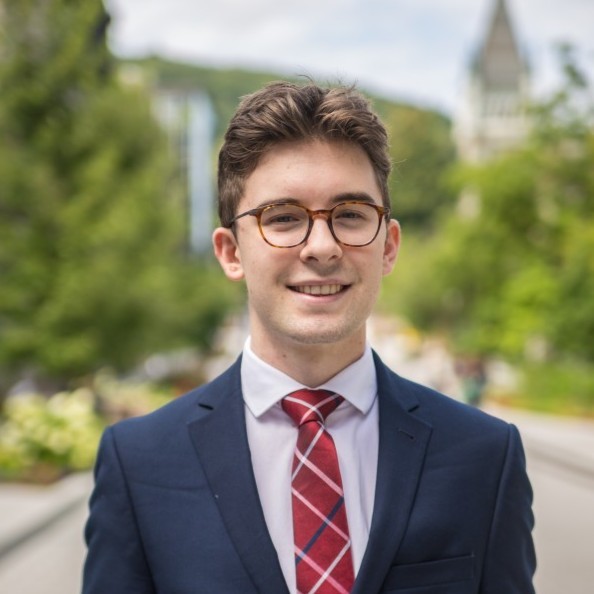Hailing from around the world, McGill’s valedictorians are a diverse, multitalented group. When they came to the University, they brought with them their unique backgrounds, passions and ambitions. While they all praise the education they received at McGill, one thing is certain, the University has benefitted just as much for having them as valuable, contributing members of our community.
These outstanding students have earned the respect of the peers who they represent through their strong academic performance, leadership and commitment to making the University – and the world – a better place.
For the Spring 2021 Convocation, the Reporter continued its tradition of interviewing the newest group of McGill valedictorians.
In the third instalment of the series, we feature Sean McNally (BComm Honours, Investment Management), the valedictorian for the Desautels Faculty of Management. You can watch the Faculty’s virtual convocation ceremony here; Sean’s valedictory speech begins at 33:00.

What is your hometown?
I was born and raised just outside Montreal in Laval, Quebec.
Why did you choose McGill?
The people and the campus. I knew I wanted to study with some of the world’s brightest students. I also always loved McGill’s location – a natural, quiet area tucked in the heart of downtown.
Three favourite places on McGill/Mac campus?
- Law Library to study
- Sandiford “bunker” to hang out
- Castel for coffee
What were some of the biggest challenges you faced during your time here and how did you overcome them?
One of the things I struggled with early on was comparing myself to others. Desautels (and McGill more broadly) is full of highly impressive, ambitious people. While it did push me to be better, the inevitable “how can I do more?” question quietly overhung.
The quickest way to snap out of this thinking is to be intentional about what you want out of your time here. Is it strictly optimizing for grades? Or what about meeting new people? Maybe it’s building a club from scratch. Whatever it is, be intentional and you’ll see that comparisons matter a lot less.
What’s next for you, both short and long term?
Short term I’ll be headed to Oliver Wyman in Montreal. Long term, to be determined.
Tell me about your Faculty and your classmates. How important have they been to your overall McGill experience?
It’s hard to overstate their importance. The first line of my speech thanked Faculty and classmates for making the last three and a half years the most formative of my life and I meant it.
It’s strange because convocations tends to have a conclusive feel about them. Yet I am convinced that the friendships and people I met in the last three years, both students and professors, will be lasting.
What will you miss most?
I know I will get flack from my friends for this, but there is something about studying for finals that I secretly enjoyed. There’s a nervous energy that completely engulfs the campus around finals season that is strangely fun and…
I’m completely kidding, I’m going to miss getting lunch at O Claf.
What advice do you have for new students to McGill?
Try to minimize the “oh my god, this is so overwhelming” period when you enter your first semester. Everyone seems like they know what they’re doing – they don’t. Some practical tips to minimize that are to join a club – you’ll meet new people, get good experience and potentially get a few job opportunities.
What was your experience with the pandemic?
I started a daily journal in March of last year to document my personal experience with the pandemic. I think it really helped me articulate the emotions I felt at the time: fear, uncertainty, guilt. The world was (and still is) in such a distorted state that I knew it could slip into a state of apathy.
What helped most for me was trying to take advantage of the reduced commute and time on my own. I joined more extracurriculars than I’d expected, worked part-time at a VC in Toronto, and reached out to several alumni. Still, I recognize how lucky I was to be able to turn the last year into a positive.
What are some of the biggest challenges facing the world today? How confident are you that we can address these challenges and make a difference?
I read a book recently by Kevin Roose called Futureproof that really changed my thinking on automation and job security. The central argument challenges the myth that there are automatable jobs (e.g. cashier) and non-automatable jobs (e.g. professional services worker). This asymmetry has created a false sense of security for the latter, which is a bucket most McGill graduates will fall into.
Roose’s solution to this inevitability is counterintuitive. Rather than compete with machines, we should try to improve our human skills – things like compassion, critical thinking and moral courage. To be clear, this is not a Luddite view of the world. It is simply a recognition that this technology will change the course of our careers and it’s up to us to be ready for that.
Getting more in touch with our humanity is something we all faced head-on last year, which gives me confidence in the class of 2021.
Do you have anything to add?
Please feel free to reach out at sean.mcnally@mail.mcgill.ca
